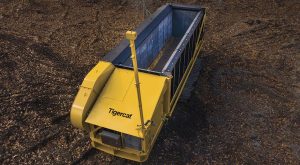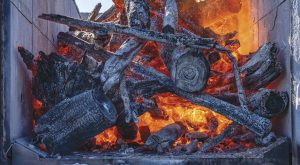Last autumn, Canadian forest machinery manufacturer Tigercat announced that they have purchased ROI, an American company manufacturing material processing machinery, including a mobile crawler for biochar production. Biochar has almost magical abilities. It binds charcoal in the ground while simultaneously fertilizing anything that grows in that ground.
ROI, with their production in New Hampshire, was owned and run by Anders Ragnarsson, who has a Swedish heritage. This is the same Ragnarsson who founded CBI, a company producing wood chipping equipment and mills. Following the sale of CBI to Terex in 2015, Ragnarsson focused on the production of equipment to create biochar. ROI is short for Ragnar Original Innovation, a company that is now part of Tigercat as its own division, Material Processing Products, of which Ragnarsson is the vice President. The brand ROI is, for now, dormant.
The 6050 Carbonator
Tigercat markets the machine as the 6065 Carbonator. The 6050 Carbonator is a crawler, a mobile charcoal producer, consisting of a ceramic chamber that is filled with remains from the forest or recycled wood, which is then set on fire. Through various techniques, for example “air lock”, the pyrolysis process is controlled in order to produce charcoal. This is then cooled down and can be pre-packaged via a transportation belt for further transportation.
Biochar
The production of biochar began to catch people’s attention in connection with our collective focus on the climate. Manufacturing coal from forest leftovers can be used for a carbon sink, since the half-life of the coal is 1000’s of years. The question is also whether there can be win-win synergies in depositing coal into the ground. On the one hand, there will be a carbon sink, and on the other, vegetation can increase through improved conditions of the ground water. And as the cherry on top, the carbon can bind pollutants and act as a catalyst.
Numbers show that 52 million tonnes of wood is deposited in the US every year. Rather than being left to rot, there’s an opportunity to convert this wood into biochar.
If you’d like to learn more about mobile biochar production, visit Tigercat’s website.
In the spring of 2020, new interesting products from Tigercat Material Processing Products and Anders Ragnarsson are expected, so stay tuned here on NordicWoodJournal.com.
Photos: Tigercat













